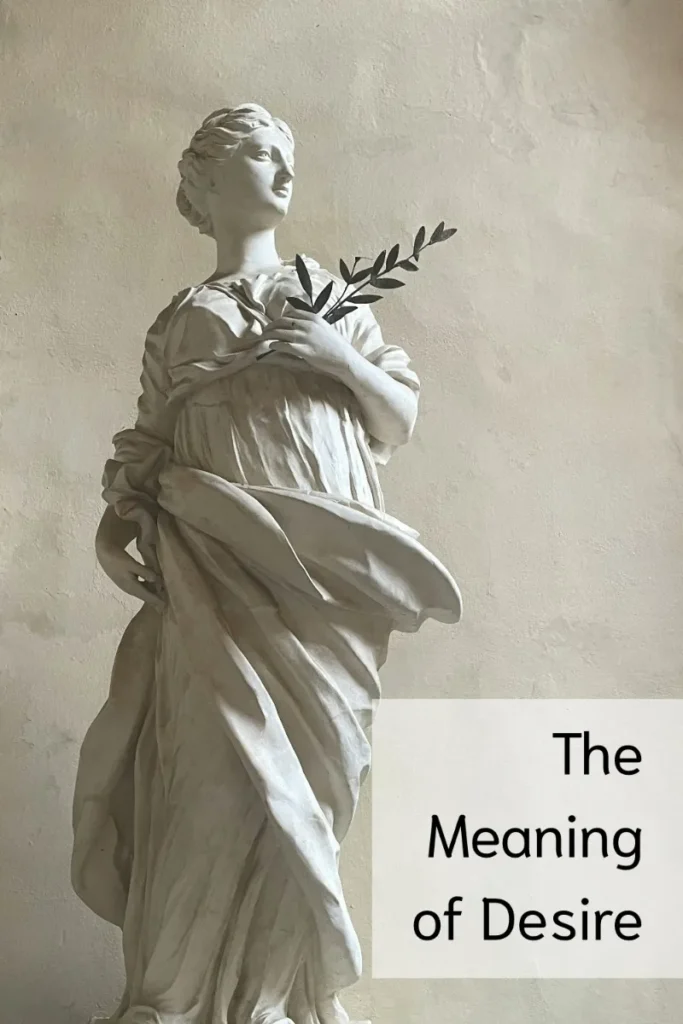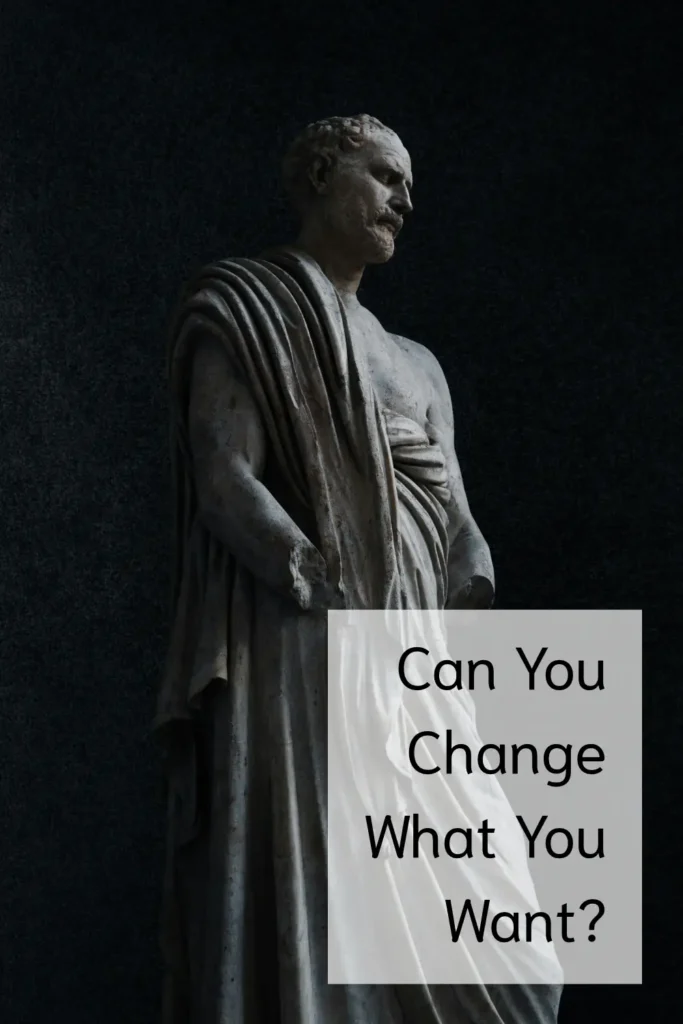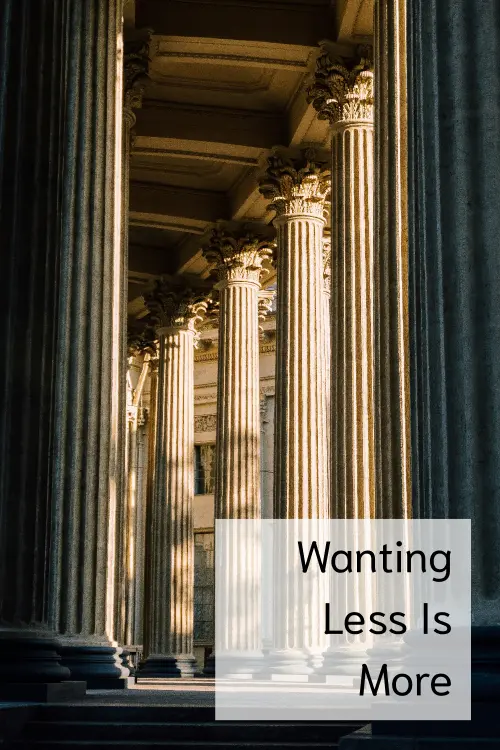What Is Desire?
Desire has a clever way of disguising itself. Sometimes it wears the mask of ambition. Other times, it shows up as craving, envy, or even love. But what is it?
At its core, desire is the sense that something is missing. A pull toward something you believe will complete you, fix you, or give you peace, once you get it. But here’s the problem: desire never ends. The moment one is satisfied, another takes its place.
The Stoics weren’t against desire entirely. They were against being ruled by it. They saw unchecked desire as the first crack in your armor. A threat to inner peace. Something that makes you chase endlessly instead of live intentionally.

What Does Desire Mean?
The meaning of desire goes deeper than just “wanting something.”
It’s an emotional and psychological force, a mix of instinct, thought, and projection.
According to the Stoic mindset, desire becomes dangerous when it’s based on illusion. You think you need that promotion, that person, that thing, because you believe it will make you feel whole. But as Marcus Aurelius wrote in Meditations:
Very little is needed to make a happy life; it is all within yourself.
In other words, the true meaning of desire isn’t about getting, it’s about noticing what you’re chasing and asking why. Is it real? Or is it just habit? Ego? Fear?
Is Desire a Choice?
At first glance, no. Desire feels automatic. You see something shiny, and boom, you want it.
But while impulse isn’t a choice, what you do with it absolutely is.
That’s where discipline of desire kicks in.
You might not control the first thought. But you can control the second one. And that’s where the Stoic gains power, not by pretending desire doesn’t exist, but by choosing not to act on every spark.
Desire becomes a choice the moment you pause and reflect.
You can step back and say:
“Is this worth wanting? Or is it just noise?”
Can I Desire Without Attachment?
Yes—but it takes work.
To desire without attachment is to want something without needing it to feel whole. It’s the difference between saying “I’d like this,” versus “I can’t be happy without this.”
The Stoics didn’t erase desire. They just put it in check. You can still want growth, love, peace, or progress. But you don’t let those wants hold you hostage. You keep them light. Flexible. Unclenched.
Desire with detachment is powerful.
It gives you the energy to act, but the peace to let go when things don’t go your way.
As Epictetus said:
Freedom is the only worthy goal in life. It is won by disregarding things that lie beyond our control.
Where Desire Comes From
You don’t wake up one morning and suddenly want more. The hunger builds slowly. Drip by drip.
It starts with a glance, a comment, an expectation. And before you know it, you’re chasing.
But desire doesn’t come from nowhere. It’s wired into us, yes, but it’s also trained. Triggered. Amplified. So if you want to manage desire, you’ve got to understand its roots first.

What Causes Desire?
Desire has a natural origin, at least at the biological level. Hunger, reproduction, safety, connection, these were once vital to survival. So we evolved to want, and want hard.
But the problem is, modern life isn’t a jungle. It’s a marketplace.
And that means natural desire has been hijacked by everything from advertising to ego.
We don’t just want to eat. We want status. We want recognition. We want likes.
That natural desire to thrive? Now it’s twisted into needing to be seen as thriving.
As Seneca warned:
It is not the man who has too little, but the man who craves more, that is poor.
Desire gets distorted the moment it’s no longer about necessity, but identity.
Can Desire Be Bad?
Not all desire is dangerous, but insatiable desire is a different beast.
That’s the kind of want that never quiets down. It feeds on more.
More attention. More achievement. More validation. More proof that you’re “enough.”
This kind of desire burns fast and loud, and it burns you out.
The Stoics saw this as the exact opposite of a wise life.
A person ruled by desire is easy to manipulate, always unsettled, and rarely present.
Wanting something isn’t the issue.
Needing it to feel whole? That’s where the rot starts.
As Epictetus warned:
Freedom is not achieved by satisfying desire, but by eliminating it.
Desire becomes bad when it owns you.
When it drags you into craving instead of clarity.
That’s when it becomes insatiable desire, and that’s when you lose control.
Should You Desire At All?
Here’s where most people completely miss Stoicism.
They think it’s about shutting down emotions, walking around like some kind of robot. Cold. Untouched.
But that’s not it at all.
The Stoics never said, “Don’t desire.” They said, “Master desire through discipline.”
The principle is simple: want only what’s within your control, and hold everything else lightly.
I learned this the hard way. Years ago, I spent months chasing a promotion. Worked late nights, skipped weekends, did everything “right.” And then, someone else got it. I was furious. For weeks, I replayed it in my head like a bad movie. Until I asked myself: What part of this was mine to control? The answer: my effort, my attitude, nothing more.
That shift didn’t make me passive. It made me precise. I still worked hard, but I stopped chaining my peace to someone else’s decision. I stopped betting my happiness on a coin flip.
And here’s the irony: the moment you stop gripping outcomes, you gain more power. More clarity. Because you finally put your energy where it counts, on what you can move.
Can You Change What You Want?
You’re not a slave to your wants.
Even if it feels like it. Even if you’ve been chasing the same things for years.
Desire is not set in stone. It’s shaped by attention, habit, and meaning.
This is where the discipline of desire matters most.
Because the goal isn’t to kill your desires. It’s to train them.
To redirect them toward something higher, something you control.

Can You Change Your Desires?
Yes. And it starts with awareness.
The discipline of desire isn’t about suppression. It’s about selection.
You don’t have to want less.
You have to want differently.
Every time you resist an impulse, you create space for a new one.
When you stop feeding shallow desires (validation, status, more stuff), you make room for deeper ones: clarity, calm, character.
The Stoics believed that if you could train your desire, you could master your life.
As Epictetus put it:
Freedom is the only worthy goal. It is won by disregarding things that lie beyond our control.
You can absolutely change your desires.
But you have to stop being entertained by the ones that keep you stuck.
How to Use Desire Without Letting It Use You?
Desire is not the enemy.
Letting it drive your decisions without direction, that’s the problem.
The Stoic mindset doesn’t eliminate desire. It flips the power dynamic.
You stop being a follower of desire and become the one setting the terms.
Ask yourself:
Is this want tied to my values, or just my ego?
Will this matter in a year, or just make me feel better today?
Am I in control of this desire, or does it control my mood, energy, or peace?
The Stoics taught that desire without control is chaos.
But desire with awareness? That’s focus. That’s power.
Don’t run from desire.
Use it as fuel, not as a leash.
How to Desire Less and Still Feel Fulfilled?
Wanting less isn’t about giving up on life.
It’s about refusing to be a prisoner to things that don’t give lasting peace.
To learn to want less, start here:
Audit your wants – Which of them are real? Which are reflex?
Practice voluntary discomfort – Skip the luxury once in a while.
Shift from outcomes to actions – Want to become better, not just appear better.
Gratitude rewires want – Look at what you already have and ask, “Who would trade places with me right now?”
This isn’t just Stoic wisdom, it’s sustainable living.
As Seneca wrote:
The greatest wealth is a poverty of desires.
Desiring less gives you more bandwidth for what matters.
Less chasing. More living.
The Discipline of Wanting Less
If desire is a flame, discipline is the fireplace that keeps it from torching your whole house.
I bought my first “dream car.” I thought it would change everything; I’d feel successful, complete, enough. And for two weeks, it did. Then the feeling faded, and all I had left was a big payment and the same restless mind.
That’s when I got it: wanting less isn’t about giving up on life. It’s about not letting wants run the show. Stoics didn’t kill desire; they refined it. They burned away the junk until what was left was clear, strong, and real.
Because the truth is, the goal isn’t to stop wanting. It’s to want better.
How Wanting Less Leads to Satisfaction?
Psychology backs it. So does Stoicism.
Satisfaction doesn’t come from having everything.
It comes from needing less.
The Stoics called this eudaimonia: a kind of grounded well-being that isn’t tied to status, wealth, or other people’s opinions.
Modern research agrees. Studies in behavioral psychology show that people who set internal goals (like growth, connection, and virtue) report higher and more sustainable happiness than those who chase external markers like money, image, or praise.
So when you reduce your wants, you don’t become “less ambitious”. You just stop wasting your ambition on things that drain you.
As Marcus Aurelius put it:
If you seek tranquility, do less. Or more accurately, do what’s essential.
How to Want Less Stuff?
If you really want to start wanting less, don’t look inside first, look around you. Your environment is quietly programming your brain every single day. What you see, what you scroll, what you compare yourself to, that’s where most of your wants are born.
Here’s what helped me hit the brakes on that endless craving cycle:
Unfollow the excess. If your feed is all yachts, luxury bags, and “perfect” lives, you’ll start craving stuff you never cared about. Cut that noise.
Gratitude—done right. Not the cheesy “write three things” stuff (though it works). Just pause and notice what you already have. It’s a baseline reset.
Voluntary discomfort. Try skipping that daily treat or the upgrade you think you need. It’s wild how freeing it feels to realize, “Wow, I didn’t actually need it.”
Kill the ‘just in case’ mindset. It leads to clutter, fake needs, and low-key anxiety.
Because stuff won’t save you. But learning to detach from stuff? That’s how you save yourself: your time, your focus, your freedom.
How I Learned to Want Less?
It hit me in two parts—one financial, one personal.
First, take consumerism. I grew up without much money, like a lot of people. Back then, I wanted all the things I couldn’t afford. But when I got older and finally could afford them, something strange happened: I didn’t want them anymore. I saw the game for what it was. Buy more, want more, repeat. I didn’t want to live like that, chasing, comparing, upgrading. That wasn’t freedom. That was being herded like a sheep.
Second, my love life. I wasn’t trying to want “less” in a cold or cynical way, but I did want less noise. Less drama. Fewer illusions. I got tired of fake closeness and constant second-guessing. The moment I decided I was done with that, done settling, done performing, I met my wife. That was 15 years ago. And we’ve been steady ever since.
So no, wanting less isn’t about missing out. It’s about tuning in. It’s about clearing space for what lasts.
Wanting Less Is More
The paradox is real: the fewer desires you carry, the more space you have for joy.
When your mind isn’t wrapped around the next upgrade, you notice the good that’s already in front of you.
When you stop chasing the image of success, you start building a life with depth.
When you stop trying to impress others, you finally hear your own thoughts clearly.
Wanting less doesn’t shrink your life, it expands it.
It gives you back your energy, your time, your peace.
As Seneca reminded us:
If you live in harmony with nature you will never be poor; if you live according to what others think, you will never be rich.
Let go of craving. And you’ll realize:
You didn’t need more.
You just needed less noise between you and your values.

When Desire Is Actually Useful
Desire gets a bad rap, especially in Stoicism. But not all desire is toxic. Some desires are signals. Signs that something meaningful is calling you. The trick isn’t to kill desire, it’s to master how you hold it.
How to Desire Without Attachment
Wanting something deeply doesn’t make you weak, but falling apart when it slips away does. That’s where the Stoics drew the line. “Want, but don’t cling.”
There’s a difference between yearning and grasping. You can want growth, love, or success without handing your peace over to it.
The trick? Learn to show up fully while holding the outcome loosely. Journaling helps. So does negative rehearsal, imagining loss to build emotional armor. And visualization keeps your aim clear without making it obsessive.
Non-attachment isn’t giving up, it’s growing up. When you stop trying to force life’s hand, your own hands get steadier. You act cleaner, calmer, sharper.
That’s emotional intelligence with a Stoic spine. Want better. But don’t beg life for it.
How to Desire Someone Without Losing Yourself
Romantic desire hits differently. It’s intense. It’s addictive. But fire doesn’t have to burn down the house.
This is where most people get it wrong. They confuse being consumed with being connected. But Stoicism teaches you something quieter, stronger:
You can feel deeply without losing your grip.
You can be drawn to someone without abandoning your values.
If you start losing yourself in someone else’s mood, attention, or approval, pause. That’s not passion. That’s a warning sign. Love that costs you your identity isn’t love. It’s dependency wearing perfume.
The Stoics knew this: You are not what you crave. You’re the one doing the craving. And you can choose how much power you hand over.
Whether you’re stuck in emotional obsession, unreturned feelings, or post-heartbreak chaos, go back to your center. Journal. Walk. Breathe. Practice silence. Let the pull exist without acting on it.
This isn’t about being cold. It’s about staying whole.
When Desire Becomes a Compass, Not a Chain
Desire isn’t always the villain. Sometimes it’s a signal. A compass pointing you toward something deeper.
Stoicism doesn’t say, “Kill every craving.” It says, “Understand it.” Ask yourself: Where is this pulling me? And why?
That thing you want so badly? Half the time, it’s not about the thing. It’s about the meaning behind it: freedom, connection, security, growth. The good stuff.
The real game is telling the difference between an ego-driven want: status, validation, applause, and a soul-aligned need: truth, purpose, direction.
Not every impulse deserves your energy. But every desire deserves inspection.
When you start treating your longings as clues instead of commands, everything changes. You stop chasing blindly and start choosing wisely. And that’s the Stoic move: turn desire into purpose, not obsession.
Desire isn’t bad. It’s just loud. Listen to it, but don’t let it take the wheel.
The Stoic Way to Want Less, Live More
What if less wasn’t a sacrifice? What if it was freedom?
The Stoics didn’t romanticize struggle. They weren’t minimalists for aesthetic points. They practiced the discipline of desire because they knew the truth:
If you want to be happy, stop wishing for things to happen the way you want. Wish instead that they happen exactly as they do.
This isn’t about pretending you don’t want things. It’s about choosing not to be controlled by them. When you want less, you start noticing more. You’re no longer pacing after the next hit of validation, attention, success, or comfort. You’re just here. Rooted. Observing. Calm.
Challenge:
For just one day, don’t feed every want that shows up. Don’t chase the little distractions. Don’t scroll for a dopamine fix. Don’t soften every hard moment with comfort food or fake urgency.
Just… watch your wants.
Watch how they rise.
How loud they get.
Then, how fast they fade when you don’t move.
This is the Stoic superpower: to want without needing. To see clearly. To walk lightly. To finally stop trading peace for cravings.
Where I come from, there’s a saying: happiness lives in the little things. And it’s true. Knowing how to enjoy the small moments: your morning coffee, a good conversation with a friend, hearing your child read out loud, sharing time with your partner—that’s where real peace is found.
There’s so much more, too. And it all ties back to the Stoic idea of Amor Fati—loving whatever life brings. You can dive deeper into that here.


